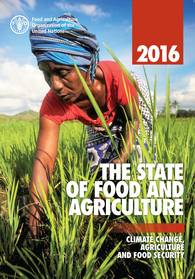 A recently released major UN report from the Food and Agriculture Organisation (FAO) warns that climate change is “a major and growing threat to global food security”. By 2030 an increase in the global population living in extreme poverty of between 35 and 122 million is predicted. The report is of particular relevance given that the UN member states agreed as part of the Sustainable Development Goals to eradicate extreme poverty and end hunger by 2030.
A recently released major UN report from the Food and Agriculture Organisation (FAO) warns that climate change is “a major and growing threat to global food security”. By 2030 an increase in the global population living in extreme poverty of between 35 and 122 million is predicted. The report is of particular relevance given that the UN member states agreed as part of the Sustainable Development Goals to eradicate extreme poverty and end hunger by 2030.
The 194-page report looks at the future of farming and food security under different climate change scenarios. The best case scenario, slow moving climate change, will only buy farmers time to adapt to changing conditions. Other scenarios predict major declines in crop yields to the point where food production could become impossible in large areas of the world.
These two issues, hunger and global climate instability, are “an unprecedented double challenge” to tackle as one perpetuates the other.
The report quite explicitly says there is “no doubt that climate change will affect the agriculture sector and food security and that its negative impact will become more severe as it accelerates.”
The report analyses possible responses to eradicating hunger and stabilising the global climate. The way forward, FAO states, is widespread adoption of sustainable land, water, fisheries and forestry practices. For small-scale farmers strategies which FAO notes include diversifying crop production, better integration of farming with the natural habitat, agroecology and “sustainable intensification”.
In a message read to mark the release of the report on World Food Day (Oct 16), Pope Francis linked the impact of climate change to migration of people from rural areas of developing countries, warning of an increase in the number of ‘climate refugees’. He also urged a greater respect for the wisdom of rural communities which can provide a defence against the logic of consumerism and production at any cost, which is aimed solely at the increase in profit.
Another major concern is that globally, about one-third of all food produced is lost or wasted.
By changing from a consumerist lifestyle, by reducing the amount of wasted food and by implementing more sustainable farming practices, the impact on natural resources and emissions can be reduced which in turn can help in reducing extreme poverty.
Ertharin Cousin, executive director of the World Food Programme summed up the report by saying “Climate change is not waiting – neither can we.”
The full report can be downloaded here
Anthony Cocomazzo (ERI Intern)